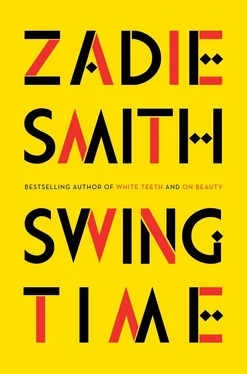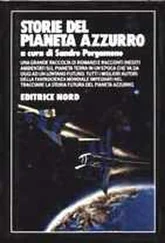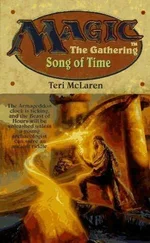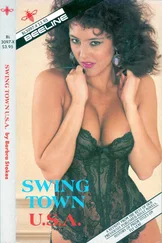Due to my strong personal convictions, I wish to stress that this film in no way endorses a belief in the occult.
So read the credits, at the beginning, these were Michael’s own words, but what did they mean? We understood only the seriousness of this word “film.” What we were watching was not a music video at all, it was a work of art that should properly be seen in a cinema, it was really a world event, a clarion call. We were modern! This was modern life! Generally I felt distant from modern life and the music that came with it — my mother had made a sankofa bird of me — but it happened that my father had told me a story about Fred Astaire himself once coming to Michael’s house, coming as a kind of disciple, and he had begged Michael to teach him the moonwalk, and this makes sense to me, even now, for a great dancer has no time, no generation, he moves eternally through the world, so that any dancer in any age may recognize him. Picasso would be incomprehensible to Rembrandt, but Nijinsky would understand Michael Jackson. “Don’t stop now, girls — get up!” cried Tracey’s mother, when for a moment we paused to rest against her sofa. “Don’t stop till you get enough! Get moving!” How long that song seemed — longer than life. I felt it would never end, that we were caught in a time loop, and would have to dance in this demonic way for ever, like poor Moira Shearer in The Red Shoes : “Time rushes by, love rushes by, life rushes by, but the red shoes dance on…” But then it was over. “That was fucking priceless,” sighed Tracey’s mother, forgetting herself, and we bowed and curtsied and ran to Tracey’s room.
“She loves it when she sees him on TV,” confided Tracey, once we were alone. “It makes their love stronger. She sees him and she knows he still loves her.”
“Which one was he?” I asked.
“Second row, at the end, on the right,” replied Tracey, without missing a beat.
• • •
I did not try — it wasn’t possible — to integrate these “facts” about Tracey’s father with the very few occasions I actually saw him, the first of which was the most terrible, it was in early November, not long after we had watched Thriller . We were all three in the kitchen, trying to make jacket potatoes stuffed with cheese and bacon, we were going to wrap them in foil and take them with us to Roundwood Park, where we’d watch the fireworks. The kitchens in the flats on Tracey’s estate were even smaller than the kitchens in ours: when you opened the oven door it almost scraped the wall opposite. To have three people in there at the same time, one person — in this case, Tracey — had to sit on the counter. It was her job to scrape the potato out of its jacket, and then my job, standing next to her, to mix the potato with grated cheese and bacon bits snipped with a pair of scissors, and then her mother put it all back in the jacket and returned it to the oven for browning. Despite my mother’s constant implication that Tracey’s mother was slovenly, a magnet for chaos, I found her kitchen both cleaner and more orderly than ours. The food was never healthy and yet it was prepared with seriousness and care, whereas my mother, who aspired to healthy eating, could not spend fifteen minutes in a kitchen without being reduced to a sort of self-pitying mania, and quite often the whole, misguided experiment (to make vegetarian lasagne, to do “something” with okra) became so torturous for everybody that she would manufacture a row and storm off, shouting. We would end up eating Findus Crispy Pancakes again. Round Tracey’s, things were simpler: you began with the clear intention of making Findus Crispy Pancakes or pizza (from frozen) or sausages and chips and it was all delicious and no one shouted about it. These potatoes were a special treat, a Fireworks Night tradition. Outside it was dark, though only five in the afternoon, and all over the estate you could smell gunpowder. Each flat had its private arsenal, and the random bangs and small, localized conflagrations had begun two weeks before, as soon as the sweetshops started selling fireworks. No one waited for official events. Cats were the most frequent victims of this general pyromania, but every now and then some kid went off to Casualty. Because of all the banging — and how used we were to bangs — at first the sound of someone beating on Tracey’s front door didn’t register, but then we heard somebody half yelling and half whispering, and we recognized panic and caution fighting each other. It was a man’s voice, he was saying: “Let me in. Let me in! You there? Open up, woman!”
Tracey and I stared at her mother, who stood staring back at us, holding a tray of perfectly stuffed cheesy potatoes in her hand. Without looking at what she was doing, she tried to lower the tray on to the counter, misjudged, dropped it.
“Louie?” she said.
She grabbed us both, pulled Tracey off the counter, we stepped in potato. She dragged us down the hall and pushed us into Tracey’s room. We were not to move a muscle. She closed the door and left us alone. Tracey went straight to her bed, got in it and began playing Pac-Man . She wouldn’t look at me. It was clear I couldn’t ask her anything, not even if Louie was the name of her father. I stood where her mother had left me and waited. I had never heard such a commotion in Tracey’s house. Whoever Louie was, he had now been let in — or forced his way in — and fuck was every other word, and there were great, crashing thuds as he turned the furniture over, and a terrible feminine wailing, it sounded like a screaming fox. I stood by the door looking at Tracey, who was still tucked up in her Barbie bed, but she did not seem to hear what I heard or even to remember that I was there: she never looked up from her Pac-Man . Ten minutes later, it was over: we heard the front door slam shut. Tracey stayed in her bed and I stood where I had been planted, unable to make any move. After a while there was a light knock on the door, and Tracey’s mother came in, pink with crying, holding a tray of Angel Delight, the same pink as her face. We sat and ate in silence and, later, went to the fireworks.
Nine
There was a kind of carelessness among the mothers we knew, or it looked like carelessness to outsiders but we knew it by another name. To the teachers at the school it probably looked as if they didn’t care enough even to turn up for Parents’ Evening, where, at desk after desk, the teachers sat, staring into space, waiting patiently for these mothers who never came. And I can see that our mothers must have seemed a little careless when, informed by a teacher of some misbehavior in the playground, they would — instead of reprimanding the child — begin shouting at the teacher. But we understood our mothers a little better. We knew that they, in their own time, had feared school, just as we did now, feared the arbitrary rules and felt shamed by them, by the new uniforms they couldn’t afford, the baffling obsession with quiet, the incessant correcting of their original patois or cockney, the sense that they could never do anything right anyway. A deep anxiety about “being told off”—for who they were, for what they had or hadn’t done, and now for the deeds of their children — this fear never really left our mothers, many of whom had become our mothers when they were not much more than children themselves. And so “Parents’ Evening” was, in their minds, not so distant from “detention.” It remained a place where they might be shamed. The difference was now they were grown and could not be forced to attend.
I say “our mothers,” but of course mine was different: she had the anger but not the shame. She went to Parents’ Evening, always. That year it was for some reason held on Valentine’s Day: the hall was limply decorated with pink paper hearts stapled to the walls, and each desk sported a wilting rose of crinkled tissue paper atop a green pipe-cleaner. I trailed behind her as she made her way round the room, hectoring teachers, ignoring all attempts on their part to discuss my progress, instead giving a series of impromptu lectures about the incompetence of the school administration, the blindness and the stupidity of the local council, the desperate need for “teachers of color”—which I think was the first time I heard the new euphemism “of color.” Those poor teachers clutched the sides of their desks for dear life. At one point, to emphasize a statement, she thumped a fist on a desk, sending the tissue rose and many pencils scattering to the floor: “These children deserve more!” Not me in particular—“these children.” How I remember her doing that, and how wonderful she looked, like a queen! I was proud to be her child, the daughter of the only mother in the neighborhood free of shame. We swept out of the hall together, my mother triumphant, me in a state of awe, neither of us any the wiser as to how I was doing at school.
Читать дальше












